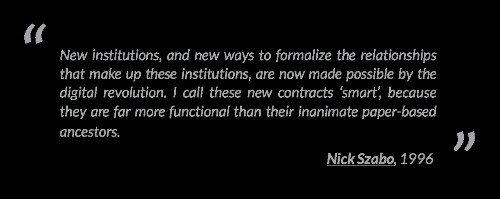Next Generation of Contracting?
STUDENT PAPER
By Baptiste Lestienne
SKEMA Business School
Lille, France
ABSTRACT
The blockchain smart contracting technology is a fresh topic constantly changing which fascinate and frighten people and institutional the same time. The purpose of this work is to get an overview of smart contract, compare their differences and their possibilities. First, I have used a Multi-Attribute Decision Making and second, a compensatory model for weighting the result. My work has highlighted the importance of security and decentralization for smart contracting regarding to the different alternative currently in the market. To conclude I would advise the Ethereum blockchain for his decentralization and community and the DPoS security system to secure a blockchain and their smart contract.
Key words: Smart contracts, Blockchain, Ethereum, Mining, Decentralization, Contract future, Online revolution, Transparency
INTRODUCTION
“Initially the term smart contract has been created by Nick Szabo”[1], computer scientist and cryptographer, in the early 1994. This term was used to describe digital engagement like protocols were both parties fulfill some commitment. At this time researcher like him, Mark S. Miller or “David Chaum”[2] were already convinced that strict execution of encrypted online protocol would be a high added value and a significant improvement of the traditional law.
In 2009 Satoshi Nakamoto release the bitcoin cryptocurrency based on the very first blockchain technology. Bitcoin blockchain is starting a huge digital revolution and in a way lay the foundation of smart contracting. The real revolution happened in 2013 with the creation of Ethereum blockchain by Vitalik Buterin. “Ethereum permit to create complex smart contract thanks to a new programming language calling Solidy”[4]. It allows developer to write complex process in a short time based in Ethereum blockchain.
When a classic legal contract just defines rules of an accord between parties, a smart contract will also freeze those rules inside a blockchain for ever and ensure the transfer of an asset if the contractual term approve it.
Smart contracts are pieces of software based inside blockchain which allow to transport and transfer assets and data without any middlemen. No human action is necessary, it lives by his own. The contract will be executed regarding the rules, that both parties agree on, and data certificate as accurate. Because of their resilience to tampering smart contracts are used in many domains, especially in those who require confidence and traceability, like money transfers, banking, insurance, respect certain agreed rules.
Over the years, many platforms allow now to create smart contract but the main one is still Ethereum. Beside it, alternative solution has been created by Ripples, Stellar or Monax. In a flourished environment the number of cryptocurrency and smart contract have skyrocket those past 3 years. CoinMarketcap is now listing more than 2080 cryptocurrencies vs 36 cryptocurrencies at the same date in 2013. The same thing had happened with smart contracts. Hundreds of thousand smart contracts are created every quarter.
More…
To read entire paper, click here
Editor’s note: Student papers are authored by graduate or undergraduate students based on coursework at accredited universities or training programs. This paper was prepared as a deliverable for the course “International Contract Management” facilitated by Dr Paul D. Giammalvo of PT Mitratata Citragraha, Jakarta, Indonesia as an Adjunct Professor under contract to SKEMA Business School for the program Master of Science in Project and Programme Management and Business Development. http://www.skema.edu/programmes/masters-of-science. For more information on this global program (Lille and Paris in France; Belo Horizonte in Brazil), contact Dr Paul Gardiner, Global Programme Director paul.gardiner@skema.edu.
How to cite this paper: Lestienne, B. (2019). Smart Contracts: Next Generation of Contracting? PM World Journal, Vol. VIII, Issue X, November. Available online at https://pmworldlibrary.net/wp-content/uploads/2019/11/pmwj87-Nov2019-Lestienne-smart-contracts-next-generation-of-contracting2.pdf
About the Author

Baptiste Lestienne
Lille, France
![]()
Baptiste Lestienne is 22 years old French student. Recently graduated of ITEEM Centrale Lille Master speciality industry and entrepreneurship option Logistics. He had pursued in parallel a Master of Science degree in Project and Programme Management and Business Development at Skema Business School, Lille Campus.
His schools provide him a complete dual competence in engineering and commerce and made him completely able to work into complex project. He is certified AgilePm, Prince2 and passed the TOEIC (840).
He is currently working for Accenture Consulting as technology advisory analyst in the financial services. He helps banks, capital markets and insurance firms create business value through technology. He also helps clients to capture the value trapped in existing and emerging technologies, such as cloud and artificial intelligence, and use these assets to drive operational efficiency and strengthen business models.
He has integrated Decathlon Philippines for his 8 months internships. He laid the supply chain and logistic foundation with the initial decathlon team to open the very first Decathlon in Philippines. His tutor and him were handling the logistic and supply chain part of the opening: finance, custom, products, transport warehousing, deliveries, supply chain, recruitment and management.
He is highly interested and passionate about new technologies in particularity about blockchain technologies and cryptocurrency: How the financial world is changing and will change. Blockchain is one of the key technologies which will change the next decade.
Through many projects in different fields, he developed a strong experience in project management and business development. He is optimist, engaged and hard-working. He is a great team member but is also able to manage a long-term project and demonstrate leadership.
Baptiste lives in Lille and Paris, France and can be contacted at Baptlestienne@gmail.com . You can have further information about his experience on his LinkedIn profile: https://www.linkedin.com/in/baptiste-lestienne/
[1] Nick Szabo. (2018, October 15). Retrieved from https://en.wikipedia.org/wiki/Nick_Szabo
[2] David Chaum. (2018, November 12). Retrieved from https://en.wikipedia.org/wiki/David_Chaum
[3] Smart Contracts. (n.d.). Retrieved from http://www.alamut.com/subj/economics/nick_szabo/smartContracts.html
[4] Solidity — Solidity 0.4.24 documentation. (n.d.). Retrieved from https://solidity.readthedocs.io/en/v0.4.24/

 [3]
[3]







